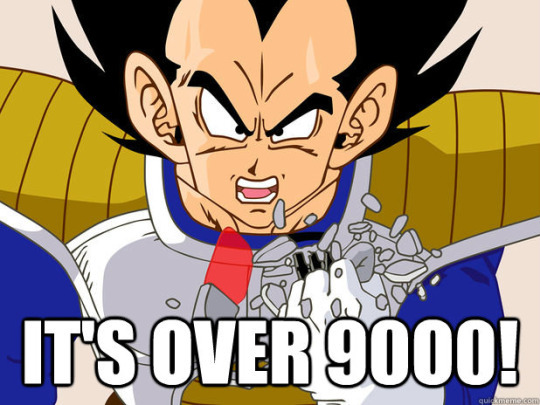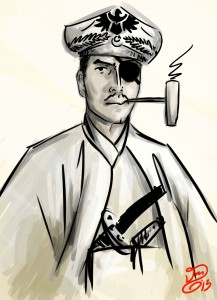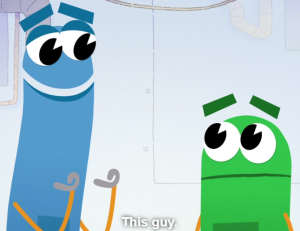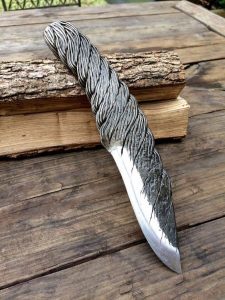Daniel M. Bensen's Blog, page 66
March 2, 2017
Fantasy Names, Lazy or Rigorous?
http://danbensen.tumblr.com/post/157898384130/my-11-year-old-was-asking-me-why-i-say-that-i-put
Thanks for the question, totally stranger whom I do not know!
I actually had exactly that experience today! I tried to read a book with bad fantasy names, put it down, then, berating myself as cynical old curmudgeon, I tried to read it again. Only then to discover that the bad fantasy names were a symptom of the deeper problems of the author’s ignorance and laziness.
Curmudgeon level elevated!

In this case, what made the names “bad” was the fact that they were obvious modifications of the names of real places and people. (Without using real examples and calling the author out) it was like saying “Naponia” or “The Zomali Empire.” Japan and Somalia are real places with real histories and cultures — cribbing their names without including that background looks lazy and disrespectful.
It’s as if the author is saying, “Oh, you like Japan? Then read my book!” but “Why do I have the people in Naponia eating tortillas? Because Naponia is a fantasy country I made up and I can do whatever I want there.”
(Note that I might end up liking a book with lazy naming if its story and characters are good enough. I’m not talking about “good” and “bad” books here, just books with lazy or rigorous worldbuilding.)
(Note also that for the sake of simplicity and clarity, I’m going to continue using Japan as an example of lazy fantasy naming. Feel free to slot other countries into my examples.)
It’s a lot better when the author makes words up: Waqareel-T’ra (Awkwards can help). In that totally fictional land, anything you want can happen and similarities to real cultures living or dead is purely coincidental. A good example is the Stormlight Archives.
Better yet is where the author makes the fantasy country in question an obvious twin of the real world, as if the story takes place in an alternate history where magic exists and things turned out differently, but not too differently. Names might share the phonology of the real languages off which they’re based (i.e. Mehun for Japan) or be historical names for the same place (e.g. Yamato, Wagoku, Tenka). Good examples are One Night in Sixes, , Uprooted and Across the Nightingale Floor. A Song of Ice and Fire juuust barely meets this standard. Also, sort of the Discworld books.
And the BEST thing to do is put in the research necessary to actually set your fantasy story in a real place and time: freaking honest-to-God Japan! Throw in some magic to keep things interesting,but do your your best to keep everything else accurate, teach your readers something, and be true to the real lives of real people.
Examples of that kind of historical fantasy are:
Jonathan Strange and Mr. Norrell
(and perhaps not actually fantasy at all, but I like them enough to include them here)
Once again, rigorous worldbuilding does not equal a good book. I love Discworld way more than The Golem and the Jinni, but I do appreciate learning real things, and I want to give credit where credit is due.
Oh hell, where did my morning go? I was supposed to be working on my novel, damn it!
Thanks again for the question. You inspired me to write a wonderful awful idea about bad fantasy names, which you can see tomorrow. 
February 27, 2017
Which Alt-hist should I write?
Inklings Press is doing a sequel to their alternate history anthology, and I want to write a story for them. But which one?
1. A sequel to my story in their first anthology, in which Muslim China contacts the Aztecs (and Buddhist China, Great Thailand, and Japan try to get in on the action) (2 votes)
2. Molasses Empire: sugar-fueled Bantu Merchant-Kings colonize the world (2 votes)
3. The Era of the Kite and Rocket: flying Assassins vrs. Vikings (2 votes)
4. Timber!: meddling time travelers delete fossil fuels from history. Things do not end well. (2 votes)
5. Agents of Re.L.I.E.F: three generations after a much bloodier World War II, the only law in Eurasia is the Law of the Skies. (3 votes)

Vote on which you like best! 
The New Junction draft…
…is with Jennie. Godspeed, little monster.
Now I’m off to play with my daughters.

February 26, 2017
Two good books
I don’t want you guys to think I hate every book I read. I just finished (and enjoyed) End This Depression Now ( https://www.goodreads.com/…/13517594-end-this-depression-now ) and Talking Back Talking Black ( https://www.goodreads.com/…/33376054-talking-back-talking-b… )
End This Depression Now paints a more schizmatic picture of American economists than I think is true (who cares about “Salt Water” versus “Fresh Water” any more?) and is silly in its eurokepticism, but Krugman makes a good point for government spending during a recession, and he is funny while he does it.
Talking Back Talking Black was great. I listen to McWhorter’s podcast so he was very much preaching to the choir with me, but if I’d read this book back in college it would have blown my freakin mind. I wish he’d talked more about the grammar and usage rules of Black English, but that wasn’t the point of his book. The point was that Black English is something I ought to study. So I guess I’m going to get right on that 

February 24, 2017
Junction Delta is done!
Junction draft delta is done!

Daisuke and Anne party with the native fauna
2/24/2017
89,000 words
Daisuke Matsumori faked a smile and held out a dead mouse. The little corpse dangled by its tail, its eyes closed, its toes clenched, observed by the cassowary.
Finished while listening to:
Now I’m going to read over it again this weekend, and send it out next week to my agent and the (god damn it) epsilon readers. And then. THEN! It goes back to the publishers for another round. As God as my witness this manuscript will be published!

February 23, 2017
Heal
There would be many kinds of emotional dysfunctions, as well as many kinds of super-powers, corresponding to humanoid monsters from myth (werewolves, vampires, zmeys, wendigos off the top of my head).
So for example the hero of the story wakes up to find they have been given super-strength and a taste for human flesh.
The hero then has to use mindfulness and rational thought to recognize and control their urges.
The first line: “On Saturday I woke up as a monster. I didn’t realize it at first. I thought I was just hungry.”

I’m not an Autobot, I’m an Atheist
I’ve just finished Fabels for Robots by Stanislaw Lem. What a ride. Intergalactic electroknights, the creation of the universe, mad robotic philosophy struggling to come to grips with the gulf between the natural and the artificial.
It basically read as a compilation of parables from the Transformers’ religious texts.
And thusly…
Autobots believe the universe was created by giant Gigant spinning as he sought to catch tiny Mocrox. They believe it is good to goad others into constructive labor and they tend to cherish tiny things (as in their children’s story “The Advisers of King Hydrops”). Autobots like humans for this reason. (splinter groups such as the micromasters are generally considered a bit nutty).
“Decepticon” is a catch-all for non-autobot, similar to medieval English “infidel.” There are many non-autobot faiths including:
The Nullificatiobists, who believe that growth and discovery will eventually stifle the universe if not balanced by death and destruction.
The Artificers, who believe nature is disgusting and evil, and only artificial things (objects created by sapience) are good. Humans, therefor, are a necessary step in the evolution of purer forms of sapience from unthinking natural matter. As such they are inherently flawed — the nature above which Robot was meant to rise.
Polycosmogeners of many stripes are united only by the belief that there have been many robot-making beings through history. The ones that came to Earth tend to believe e humans are immoral (practically if not inherently), since they create machines to be their slaves.
And many irreligious robots hate and fear humans because they are afraid that our associated ecology with its oxygen and water will cause them to rust.

February 20, 2017
Who walked around in circles in the park yesterday while writing the his book’s next scene on a kindle?
The True Name of the Bear
I spent way too much time on a response to this post.
Ancient Greek, Latin, Sanskrit, and a bunch of other Indo-European languages have cognate words for “bear” (arktos, ursus, ṛkṣa and so on). Germanic languages like English lack this word, however, since the proto-Germans had a taboo against naming feared animals. They used the word *beron (“the brown one”), which evolved into English “bear.”
But what if they didn’t?
original proto-Indo-European: *h₂ŕ̥tḱos itself probably a derivative of *h₂rétḱ-os, or “destruction” (which I bet makes it at least a cousin if not the origin of Rakshasa)
late PIE: *h₂ŕ̥ḱþos
proto-Germanic: *urhdaz
Old English: *ord (strong a-stem declension)
Modern English: ord General American /ɜːrd/ Received Pronunciation /ɜːd/
So there you have it. The True Name of the bear, in English at least, is “ord.” Rhymes with “word.”
Use it carefully. 
Just a bit of fun with magic knives
When the Becalmer looms over you, shadows writhing on its talons as it reaches toward your pituitary gland. But the handcuffs that they used to chain you to the chair are iron.
With an effort of will easier to do than describe, you unspool the cold metal around your wrists. Skeins twist under your fingers. A pinch and pull like closing a ziplock bag and the blade is ready.
There’s no time to look; time only to whip your arm around, burying the colloidal weapon in the unclean flank of the beast.
That’s when one of those things would be useful.







